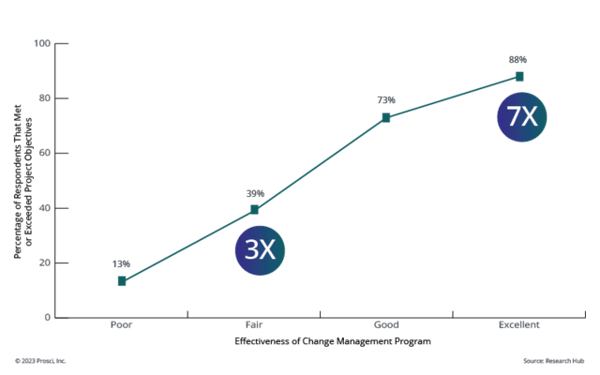Building an Agile Culture Through Digital Transformation in Africa

5 Mins
Updated: January 16, 2026
Published: March 8, 2023

Sub-Saharan Africa is home to the world’s youngest population—one that is increasingly well-educated, innovative and entrepreneurial—and they want technology-driven workplaces. As hybrid modes of working became common here and around the world, technological solutions and innovations have grown more important in helping remote teams collaborate and manage their tasks. This creates a need for Agile approaches and change management.
Growth of Agile Approaches in Africa
The Global System for Mobile Communications Association (GMSA) reports that 495 million people subscribed to mobile services in Sub-Saharan Africa by 2020. As Africa adopts digital technologies, governments and organizations are moving to accelerated, people-focused, and collaborative Agile approaches, such as Scrum, Kanban, and Scaled Agile Framework (SAFe), with the majority making use of Scrum.
Still, Africa is filled with traditional business models and resistance from leadership communities to adapt to Agile models. Until now, the common way of handling projects has been process-intensive and traditionally hierarchical. Difficulties organizations are facing with adopting Agile approaches include a lack of commitment and sponsorship from senior leadership, general organizational resistance to change, political culture, managerial apathy, and an Agile skills gap. However, with consistent efforts, we can build a future centered around ingenious software development solutions from Africa.
Africa’s bright future amid challenges
Although Africa’s adoption of Agile lags compared to the rest of the world, the next two decades show promise. Tech startups, small and mid-size enterprises, and large corporations are starting to recognize that a collaborative approach to solutions and product development leads to more productive and value-driven results.
To maintain progress, organizations need to overcome challenges and setbacks due to mismanagement of human resources, poor employment structures, lack of access to essential amenities, and lack of strategic decision-making. Organizations also face political instability, and underdeveloped social and IT infrastructures. Clearly, for Africa to keep up with the rest of the world in digital transformation, we must find effective ways to tackle these issues.
How Organizational Agility Supports
Digital Transformation
Digital transformation is the process by which organizations adapt new ways of creating or altering business processes through technology. For instance, when Prosci began delivering the Change Management Certification Program virtually due to COVID-19 restrictions, Cedar Africa Group adapted the virtual approach in Africa. This digital transformation improved the customer experience by enabling clients to meet their changing business and market requirements.
Successful digital transformation requires organizational agility—the ability of a company to quickly respond and adapt to the macroenvironment and microenvironment. In the ever-changing digital economy, organizations can stay ahead of the curve and gain competitive advantage if they develop the ability to quickly sense and respond to customer needs while staying true to the organization’s mission.
The Government of Kenya is a great example of this. When phone penetration among adults shot up to 98% with 43% of adults using the Internet, the Kenyan government realized it had to swiftly adapt to the changing needs of its citizens. Kenya placed citizens at the center of the country's growth and, more crucially, enhanced their standard of living through digitalization. Through “Vision 2030,” the Kenyan government shifted its agenda to enabling access to government services online, including computerized judicial procedures, land registries, car registrations, and licensing of drivers, among other initiatives.
Technology start-ups in Africa are also helping to fuel the continent’s digital transformation. Of more than 600 new ventures across the continent, eight African start-ups were named in the World Economic Forum 2021 Technology Pioneers list. These start-ups include Cambridge Industries (Ethiopia), FlexFin Tx (Zimbabwe), Kuda (Nigeria), Moringa School (Kenya), mPharma (Ghana), Sokowatch (Kenya), 54Gene (Nigeria), and Gro Intelligence (Kenya).
For instance, mPharma has improved access to medicines in Ghana and four other African countries, including Kenya, by providing innovative financing and inventory management technology solutions to hospitals, pharmacies and patients.


Opportunities, problems and gaps
The growth of technology in Africa has created many opportunities for people.
Consider the e-commerce explosion. As in other parts of the world, the customer experience of accessing products and services has improved immensely in Africa, and it has created a ripple effect on communities. Because Africa is adopting the use e-commerce services through companies like Jumia, Bolt and Uber Eats—ordering food and household goods for delivery has become commonplace. This digital transformation created jobs for cyclists and motorcycle riders, improving the lives of those who work in the industry.
Along with opportunities comes risk. With the COVID-19 pandemic forcing many companies to either close shop or adapt to a hybrid system of working, there has been a negative impact on organizational culture. Most companies have either incorporated remote working policies or hybrid model, which has afforded flexibility and physical safety for workers.
But the change also impacted the psychological safety that employees need to comfortably relate with one another, thus resulting in reduced team collaboration. Prosci's research study on the Top Contributors to Change Success in a Post-Pandemic World includes insights on emerging contributors, including the notion that collaboration and connection are more difficult in organizations today and require intentionality to get right. Organizationally agile companies are now beginning to deploy change management to improve employee engagement, so they can maintain and improve organizational culture.
How Change Management Helps Build Organizational Agility
Prosci defines change management as the application of a structured process and set of tools for leading the people side of change to achieve a desired outcome.
As a discipline that endeavors to prepare, equip and support people during times of change, change management helps people successfully transition from the organization’s current state (e.g., manual processes) to the organization’s desired future state (e.g., digital ways of working). In this way, change management helps lay the critical groundwork for building organizational agility.
Consider a commercial, tier 1 bank in Kenya licensed by the Central Bank of Kenya that needed to build change capability in senior leaders, managers and change practitioners. The bank was undertaking an IT transformation project to change their core banking system and improve their operational efficiency, relationship management and customer experience. Cedar Africa Group provided the Prosci change management training for different levels of staff in the bank.
Upon successful change management sessions, a structured and systematic process to ensure the bank’s realization of intended business outcomes was born. Leaders became confident in leading their teams through change. And they found a common language within the bank to discuss change at both an individual level and organizational level. All while creating commitment to the change and mitigating resistant behaviors from impacted people.

Nyawera Kibuka and Cedar Africa Group
Resistance and adaptability during digital transformation
No matter where you are in the world, two of the most challenging issues organizations face in any digital transformation are resistance and adaptability. Effective change management addresses both.
Resistance to change
Resistance is a natural and human reaction to change. Most people react with some level of resistance when exposed to digital transformation, which often changes the core ways of doing things in an organization. Individuals need to be supported as they gradually build up their desire for the change. Without this support, resistance can cause a project or initiative to struggle or fail. Change management provides a framework to support people impacted by digital changes and helps organizations monitor utilization through the transition.
Adaptability
The ability to adapt is critical for organizations to keep up with the competitive business environment. Effective change management focuses on preparing, equipping and supporting people in organizations who must adapt to the digital solutions that continuously shift job responsibilities, processes and expectations.
By applying a structured, repeatable approach to change management, people who must change the way they do their jobs get what they need to succeed, and the organization gets better project results like greater ROI and lower risk. Participants in Prosci's correlation research confirm that excellent change management increases the likelihood of meeting or exceeding project objectives by as much as seven times.

Change Management Enables
Successful Digital Transformations
Adjusting to change is not a skill that comes naturally to everyone. In fact, in some people, change can trigger a range of emotional reactions, from mild discomfort to intense panic or fear. When this happens, it is important to prepare and equip senior leaders and managers through coaching. All impacted groups and their leadership teams need support through every phase of a change. When done effectively, change management helps you enable successful digital transformations and changes of all kinds and in all parts of the globe.




